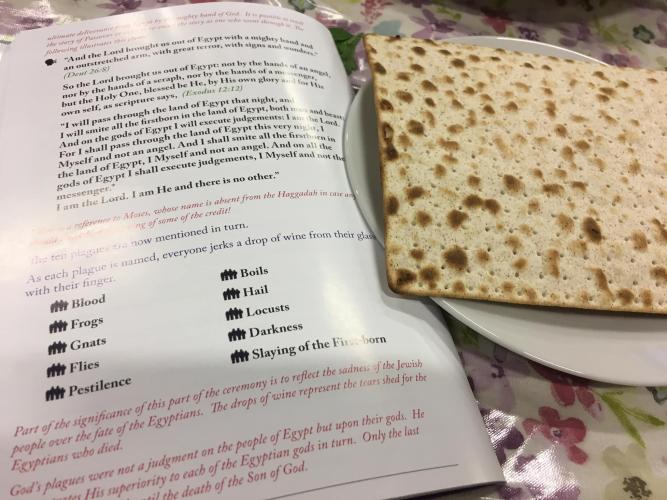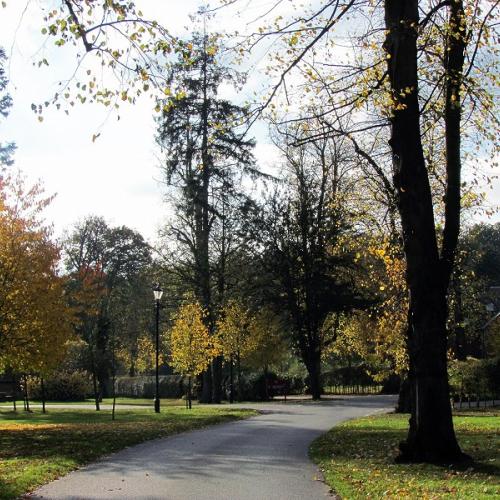A brief reflection...
Over many years CMJ staff and volunteers have helped a diverse range of Church groups to share in a Passover meal celebration. These have mostly taken place during ‘Holy week’ with a particular focus on Maundy Thursday, although any date can be used. These events have generated in many a deep appreciation for the Biblical Jewish roots of the Christian faith alongside a deeper understanding of the context of the death of Jesus and the origins of Holy Communion.
I have led about 60 such events spread over 20 years, and have received much encouraging feedback. Such feedback focuses upon the wonderful mixture of fellowship, worship, teaching, and outreach which such events often generate.
For me, I am keen to be as transparent as possible in preparing for such an event with a Church group. Some may take a different approach, but for me I want to stress the following 4 convictions in promoting a Passover event:
· A Passover meal within a Church setting is primarily an educational event (although as the feedback suggests clear elements of fellowship, worship and outreach are present).
· The event should be viewed as a shared community experience not as a set liturgical service.
· A Passover meal is not a Holy Communion service and should not ‘morph’ into a sacramental celebration, although as the meaning of the third cup is explored and as the wine is drunk and the matzah is eaten clear connections with Holy Communion will come into focus for many participants.
· The Passover meal which CMJ leads draws upon insights and convictions from Christians and especially Jewish Believers in Jesus. In this sense additional material will be shared and fresh interpretations will be given which do not appear in most other Passover meals. This is not misappropriation but a legitimate development of a living tradition.
In terms of educational ‘outcomes’ I see a well-led Passover meal bringing some useful first steps of knowledge in the following 5 areas:
· A discovery (or rediscovery in some cases) of the rich Biblical Jewish roots of the Christian Faith. Many of these ‘roots’ have been lost or deliberately severed by Churches embedded in a Replacement Theology culture. While other roots have been absorbed into the life of the Church (often without recognising this), roots such as a calendar (the 8 days of Holy week link to Passover which is an 8-day festival), the public reading of Scripture, the lectionary, baptism, ordination, overseers, the use of bread and wine etc.
· An awareness of the importance of the Exodus event and the pilgrim festivals in forming and maintaining Jewish identity.
· An appreciation of the links between Passover, the last supper and Holy communion.
· An understanding of the significance of Jesus as the Passover lamb (1 Corinthians 5:7) and the sacrifice of atonement made through the shedding of His blood (Romans 3:25).
· An awareness of the ‘Jewish’ context of the ministry of Jesus.
The charge of cultural misappropriation is important to engage with. When this charge is articulated it comes mainly from parts of the rabbinical Jewish community. However, if the 4 convictions (see
above the 4 bullet points for promoting a Passover event) are understood and presented in a transparent and considerate way, I am confident the charge will not be upheld by many. I think what often lies behind this charge of cultural misappropriation is the deeper conviction held by some within the Jewish community that there is no legitimacy whatsoever for those who would want to celebrate and explore an identity as a Jewish Believer in Jesus. This is a view which we in CMJ resolutely refute. Standing with, encouraging, and learning from Jewish Believers in Jesus has been a key aspect of our ministry, since our formation in 1809.
However, the charge of cultural misappropriation sometimes comes from parts of the Church community, who do not see the need for such Passover events. It is not possible to fully judge the reasons for this, but for some there is simply a desire to uphold their own Maundy Thursday liturgies and traditions, while for others there may well be a fear of, or misgivings towards exploring this rich Biblical Jewish heritage. However, it is worth pointing out to those with such fears or misgivings that Paul instructs and encourages the predominantly non-Jewish Church in Corinth to observe the Passover. This fear or opposition may in some cases be fueled by a strong Replacement Theology and sadly elements of anti-Semitism can lurk consciously or unconsciously in those embedded in such a theological mindset.

In my experience, when the reasons for sharing in a Passover are given and the methodology explained most Churches are open to hosting a Passover event at least once. I have only experienced one Church leader who resolutely refused to have such an event. This was not due to concerns about cultural misappropriation but out of a theological conviction based (as far as I could perceive it) upon a view that such events will undermine the Gospel and lead to a form of religious pluralism. For many Church leaders a well led Passover event becomes embedded within their annual calendars and is seen as a greatly valued resource. Especially valued as an event which is open to children (multi-generational) and is multi-sensory and participatory in style. Such a multi-sensory and participatory method of learning is sadly lacking in many ‘brain-centered’ and formal Church teaching settings.
For us within CMJ we will continue to promote Passover events. We are thankful for the positive feedback and encouragement received in many cases. However, we are not immune to the concerns of cultural misappropriation felt by some, and we will do all we can to listen carefully to such views and carefully explain our methods and values. Above all we will seek to act with authenticity and transparency as we celebrate the redemptive purposes of God who seeks to redeem us all through His mighty and outstretched arm.



